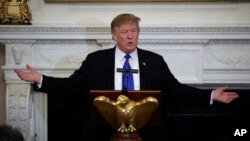The United States and China are eyeing a summit between their two leaders to finalize a trade deal and avoid an escalation of trade tensions. Former U.S. officials and experts, however, are skeptical as to whether a trade deal would solve China's predatory economic policies in the long term, warning a trade deal may only provide temporary relief.
On Monday, U.S. President Donald Trump was optimistic that a trade deal with China could be reached, adding he planned to hold a summit with Chinese President Xi Jinping to finalize details.
“We’re going to have another summit, we’re going to have a signing summit which is even better. So hopefully we can get that completed. But we’re getting very, very close,” said Trump in his remarks to a group of American governors at the White House.
A day earlier, Trump said he would delay an increase in U.S. tariffs amid “substantial progress” in trade talks. The president had set a March 1 deadline to increase tariffs on $200 million in Chinese goods from 10 percent to 25 percent.
Stocks markets in China closed up more than 5 percent Monday, rallying after Trump announced he was postponing new tariffs on China because of what he said was "substantial progress" in trade talks between the world's two largest economies.
"A very good weekend for U.S. and China," Trump tweeted Sunday, saying both sides made progress on "important structural issues, including intellectual property protection, technology transfer, agriculture, services, currency, and many other issues."
A senior fellow at Georgetown University, James Green, told VOA he is doubtful that another trade agreement with China will resolve core issues.
“We have to wait and see what is in the agreements, but I have a hard time believing that fundamental issues like industrial policies and favoring Chinese companies will be eliminated as areas of concern,” said Green, who was the most senior trade official at the U.S. Embassy in Beijing.
“Hopefully, these agreements will improve transparency and curb certain Chinese government activities that distort markets, but they will not eliminate such policies and practices,” he added.
Other experts said while the tariff extension is a positive sign, a number of challenges must still be overcome.
“Any ultimate deal will still run into issues around enforcement. That has always been a problem that has plagued the bilateral relationship, including under [former U.S. President Barack] Obama, owing in part to the degree to which these structural issues are embedded in China's policy framework,” said Nick Marro, China analyst at the London-based Economist Intelligence Unit.
“This is unlikely to change even if we do see some type of deal later on, particularly because the credibility of the U.S. appetite for punitive trade actions may now be in question,” Marro added.
Political commentator Pokong Chen told VOA’s Mandarin service that President Trump should not allow the Chinese Communist Party to succeed in what he says is its repeated tactic of buying more time amid trade disputes.
Chen warned that the U.S. should be wary of Beijing’s scheme of “attacking while talking;” in other words, continuing the cyberattack against the U.S. [to steal trade secrets] during trade negotiations
Aaron Friedberg, professor of politics and international affairs at Princeton University, warned the United States may be on the verge of accepting a partial and superficial trade deal with China that doesn't address China's predatory trade, industrial and technology promotion policies.
Friedberg advocated for an alternative approach to keep up the pressure and resist demands to lift tariffs in return for anything less than significant, verifiable progress in rolling back China’s aggressive and market-distorting trade, industrial, and technology promotion policies.
Senior U.S. and Chinese officials have been holding a series of trade talks in Beijing and Washington since Trump and Xi declared a 90-day truce in their trade war in December so a deal can be worked out.
The U.S. has long accused China of numerous unfair trade practices. They include the alleged theft of intellectual property and demands U.S. firms turn over trade secrets if they want to do business in China.
The Chinese have denied the accusations and say it is the U.S. that is guilty of trade violations meant to stifle China's economic development.
VOA's Mandarin service contributed to this report.





